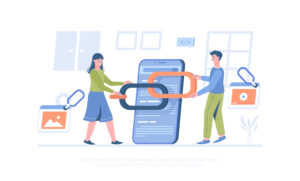As an essential part of eCommerce SEO, link building can help you build a solid online presence that potentially pushes your business to the first page of Google. Like having a physical store on a busy high street, ranking highly on Google can help you get tons of sales simply because you’re right where people want to spend money.
With eCommerce growing stronger each day, getting creative with your link-building strategies is essential to be at par with your competitors. A Semrush report enunciates that backlinking has continued to be among the top factors for building a site presence. But,
What are eCommerce Backlinks?
Backlinks are links from other websites that point back to a page on your website. Since they represent another website’s traffic coming to your site, they are also called inbound links. Depending on the quality of the backlinks, you can rank higher or lower in search engines like Google.
When you link to a high-quality and relevant website, you get a link juice that can pump up your domain authority, attract new traffic, and help you rank better in search results. This way, you can improve your SEO and earn more money in terms of sales.
Why You Want SEO eCommerce Backlinks
From attracting more traffic to making your site visible to increasing your revenue, SEO eCommerce backlinks play a vital role. Since your backlinks indicate that your website is reputable and trustworthy, they help with ranking factors, making your site relevant, authoritative, and influential.
Most of the factors that determine the success of an e-commerce site, such as ranking and traffic, also rely on backlinks to perform well. For instance, external links are usually used to refer potential customers to your website and establish trust in the eyes of search engines.
By improving your ranking and visibility, you can get people to visit your website and increase your eCommerce revenue. Thus, high-quality links play a vital role in ranking, thus helping most successful e-commerce sites rank well for their respective markets because they build quality links. According to studies, over 25% of Google searchers usually click on the first organic result.
What Makes Quality SEO eCommerce Backlinks
The most critical factors determining the quality of SEO eCommerce backlinks include authority, power, and relevance. A smart link-building strategy for eCommerce sites should contain each component in varying degrees. For instance, a quality backlink can be high in authority or power but low in relevance. Likewise, it can be highly relevant but low in authority and power.
While most people think high-quality backlinks would have a lot of each factor, this is rarely the case; hence, it shouldn’t be ultimately your goal. If a backlink is vital in either of the three factors, it will improve your ranking. It’s advisable and preferred for your backlink profile to be evenly distributed among these factors. So, for your backlinks to increase in quality and ranking power, it should have more of these factors depending on Google’s analysis.
Common eCommerce Backlinks Building Challenges and How to Overcome Them
Regarding link building, the biggest challenge for building eCommerce backlinks for your website is not having enough linkable content. Since quality content takes time to create, publish, and rank, you need a published catalog for other websites to link back to you. It can also be challenging for your e-commerce websites to withstand competition against big names such as Etsy, Amazon, eBay, and other established e-commerce marketplaces.
Since such platforms have acquired high-quality backlinks, tons of traffic, and superb authority, catching up with them seems almost impossible.
This means content is the best way to earn more links to your e-commerce website. You need to include a blog section on your site and publish content like:
- Articles
- Guides
- Blogs
- Infographics
- Other relevant information for your website
So, the first step is to know what your audience is interested in and then create content that interests them. The higher the quality of your content, the more likely you are to earn backlinks. You can also use other brilliant eCommerce link-building strategies to acquire backlinks. Instead of just having generic content, you need to publish lots of high-quality content that readers may find valuable, such as lifestyle hacks, recommendations, and DIY guides.
Types of Backlinks for eCommerce
Given that not all backlinks are viable for businesses, it’s best to check the quality of every link you acquire for your website. Low-quality, defunct, or artificial backlinks for eCommerce sites may not drive traffic to your e-commerce website and may end up causing more harm than good. So, before you build backlinks for eCommerce, you must understand the different types of backlinks. Here are some of the most common types of backlinks you can acquire;
Dofollow backlinks: As the name suggests, dofollow backlinks are links that allow the search engines to point back to your site. Since they allow the transfer of link juice between the pages, they are essential for your eCommerce SEO strategy.
Nofollow backlinks: As the opposite of dofollow links, nofollow links are represented as hyperlinks with a rel= “nofollow” tag. Since Google doesn’t crawl them, they do not transfer the link juice; hence, they do not affect the search ranking.
External backlinks: External links refer to the links that connect external pages to your website; hence, they are used to drive the link juice between the pages and improve your website domain authority.
Internal backlinks: Unlike external links, internal links connect one page to another within the website. Besides increasing visitors’ time on your website, they also significantly reduce bounce rates.
Profile backlinks: These are links found in the profile section of your website. While they do not necessarily contribute to search ranking, they are used to build content authority.
Contextual backlinks: Contextual backlinks are used to cite sources and build authority for the website.
Natural backlinks: These are organically occurring links in websites. As some of the most important links, they usually lead to more naturally relevant content to the source website and are the best way to increase domain authority.
Artificial backlinks: Are artificially created backlinks that link the main page to the newly created page. Since this is usually a black hat SEO, it’s not among the best ways to develop eCommerce SEO strategies.
Strategies for Building Backlinks for eCommerce Sites
Here are the key strategies you can use to build backlinks for eCommerce site:
Broken Link-Building Strategies
Looking for broken links and fixing them can help you build a robust backlink repository for your eCommerce website. To find these links, you need to assess your competitor’s page and check which links work and which don’t.
First, you need to invite the business to help fill that gap with your relevant content in exchange for a dofollow link. The process for finding broken eCommerce backlinks for your website includes a few extra steps like:
- Search for niche sites and examine their links.
- Look for the proper authority and connect with them using the perfect pitch to plug in the link.
- Brainstorm content topics.
- Create a guest post and receive the link upon approval.
By fixing these broken links, you’ll help the website owners avoid their 404 errors and get quality backlinks that will help establish you as an authority. While a website can have a great traffic flow and DA, it can’t be without its share of broken links. So, if you are an eCommerce store, you can leverage this gap by creating content on similar topics and gaining the link juice in return.
Answer Questions with FAQs, Manuals, and Helpful Resources
Resources like FAQs and how-to manuals are informational resources that are particularly useful for products and services in niche markets. For instance, if you are marketing technical products that buyers want to know about, you can consider writing a glossary, PDF technical manuals, or a simple FAQ about your product and services. Once done, you can consider publishing comprehensive information that delivers quick answers to users.
If users find your linked helpful content, they may consider sharing it online, ensuring it reaches as many people as possible. While doing this, don’t forget to link back to your eCommerce website product page so that it can rank.
Use Social Media To Attract Backlinks
As one of the most highly used platforms, social media can help you promote your website link and strengthen your SEO strategy in return.
You can start by adding your website link to your social media profile so your followers can click the link to learn more about the product. These profiles can be your business profile, personal profile, or even the community page.
For example, if your eCommerce store sells weight loss products, you may decide to add your website link to your Facebook or Instagram, making it easier for your followers to access the website.
Submit Your Website To Directories and Forums
Submitting your website to niche forums or directories is also an excellent way to gain a reputation and attract high-quality eCommerce backlinks. Regardless of your business, there are a ton of directories and forums for local companies, specific industries, organizations, products, and services.
When doing this, you must avoid spammy or untrustworthy directories, as these sites don’t follow Google’s rules and best practices. These links won’t be that powerful, but they’ll help diversify your link profile and add relevance and trust to your ecommerce store.
Find Unlinked Mentions of Your Brand
Your eCommerce brand or your products may already be mentioned online, but you are not getting any notification since they are not linked to the content on your website. If this is the case, you can use automated tools to search for the mentions and ask the webmaster to allow you to get a link back to your website or eCommerce store.
You can also set up a Google alert so that you are notified whenever someone publishes an article or content with your brand name. You can always set up alert settings based on the source, language, region, and frequency you want to receive emails. While this is an easy way to build backlinks for eCommerce, it only works for established stores.
Engage With Forums
One of the best ways to connect with your target audience is by engaging in community forums or discussions. As a community of like-minded people, a forum is where people raise questions and freely discuss specific topics. You just need to sign up in places like Reddit and engage other community members.
With approximately 1.2 billion monthly visits, Reddit can be a great place to connect with people from all walks of life and get valuable backlinks for your eCommerce site. You can start by joining relevant communities on Reddit and different platforms and looking for content or questions about your industry. Being the industry experts, you can begin answering these questions and giving valuable input to the community.
You can then gradually add links to your business with answers so your responses do not appear promotional. This way, you can acquire high-quality backlinks and boost your e-commerce SEO strategy.
Collaborate With Influencers and Bloggers
Collaborating or building relationships with influencers can be a powerful way to get high-quality eCommerce backlinks. Look for influencers with a huge following and suggest partnerships that mutually benefit you. This could be sponsored content, promotional campaigns, or even product reviews. You can also take advantage of the social commerce features in various social media platforms that allow users to click on the website link or product immediately.
For instance, if you want to build credible links for your health and wellness brand, you can contact authentic health and fitness influencers to help you out. These influencers can also tag your e-commerce brand in their blogs and YouTube accounts and create a solid backlink to your site. One of the stores that leverages influencer marketing is BetterMe. By using influencers, this eCommerce store has increased traffic to its social media page and boosted sales.
Use Data From Customers To Create Content
It’s obvious that if you have supporting evidence, you can easily prove a point. This is why many bloggers and writers often use statistics as a backup to what they are saying. If your business is already established, chances are you have a massive email database for email marketing, which you can use to create this information.
For example, if you have an eCommerce store dealing with weight loss supplements and a database of 2,750 people, you can use this strategy to gain backlinks.You can use online tools such as Typeform or SurveyMonkey to create a survey for your customers and ask them questions such as:
- What do you consider when you want to buy supplements
- How much money do you spend on supplements every month
- Do you prefer to buy supplements online or offline?
In the end, your reputation depends on the accuracy of the data you put out there regardless of whether you’re aggregating data or tapping proprietary data
Write a Testimonial
If there’s a product you find yourself using every day, you can become an advocate for it. Many companies nowadays rely on case studies and testimonials to help them build trust and increase sales.
To make the strategy work for you, you can contact the companies and inform them that you intend to get involved in the case study. But if this interests your brand, you can still get a backlink by providing a short testimony.
Monitoring and Analyzing Backlinks for eCommerce Sites
Even after acquiring high quality backlinks for eCommerce sites, you regularly need to carry out an audit and remove any toxic or low quality backlinks pointing back to your website.You can use tools such as Ahrefs and Google Search Console and Ahrefs to help you identify these links.. Remove or disavow these links to ensure the health of your backlink profile.
You’ll also want to analyze the backlink profiles of your competitors’ backlink profiles to gain insights you can use for your backlink-building strategy. Find out websites that link to your competitors and offer them compelling content that could help you acquire backlinks.
Why You Should Avoid Buying Backlinks
While most businesses have previously fallen into the trap of buying backlinks because of the promises of instant SEO success and thousands of organic traffic, purchasing or paying for backlinks might be a waste of time and money. Here are some of the risks involved in buying backlinks;
Google Disapproval: Search engines like Google do not like people buying backlinks; hence, they penalize you if you engage in this activity, affecting your search rankings.
Unsustainable Results: When it comes to backlinks, relevance is key. Bought backlinks, especially if they lead to irrelevant sites, offer little value compared to natural backlinks.
Spammy Content: Buying backlinks may also result in low quality links, eventually affecting your website’s credibility.
Conclusion
With eCommerce link building increasingly becoming important, it’s best if you focus on building links to get traffic and generate revenue. Unless you sell an increasingly popular or innovative product, ranking well on SERPs and getting people to visit your site will not be easy. Since improving your ranking is your primary goal, ensure you focus on quality and consider factors such as authority, power, and relevance when looking for backlinks.
Plus, ensure you create a natural link profile by applying a link and anchoring diversity throughout your content. By being smart and following the best practices, you won’t have to worry whether you’re using white or black hat tactics to build eCommerce links.


